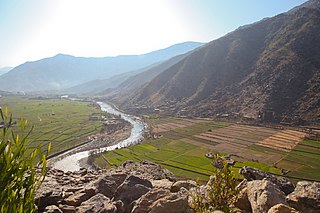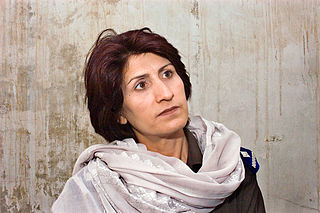Related Research Articles

Burhānuddīn Rabbānī was an Afghan politician and teacher who served as president of Afghanistan from 1992 to 1996, and again from November to December 2001.

Kapisa is the smallest of Afghanistan's thirty-four provinces and is located in the north-east of the country. It has an estimated population of 496,840 people and an area of 1,842 km2 (711 sq mi), making it the most densely populated province apart from Kabul Province. It borders Panjshir Province to the north, Laghman Province to the east, Kabul Province to the south and Parwan Province to the west. Mahmud-i-Raqi is the provincial capital, while the most populous city and district of Kapisa is Nijrab.

Laghman is one of the 34 provinces of Afghanistan, located in the eastern part of the country. It has a population of about 502,148, which is multi-ethnic and mostly a rural society. Laghman hosts a large number of historical landmarks, minarets, monuments, and other cultural relics that are manifestation of its old history and culture. The city of Mihtarlam serves as the capital of the province. In some historical texts the name is written as "Lamghan" or as "Lamghanat".

Nangarhār, also called Nangrahar or Ningrahar, is one of the 34 provinces of Afghanistan, located in the eastern part of the country and bordering Logar, Kabul, Laghman and Kunar provinces as well as having an international border with Pakistan. It is divided into 22 districts and has a population of about 1,735,531, the third highest of the country's 34 provinces. The city of Jalalabad is the capital of Nangarhar province. Nangarhar province is famous for its fish and karahi dishes.

Kunar is one of the 34 provinces of Afghanistan, located in the northeastern part of the country. Its capital is Asadabad. Its population is estimated to be 508,224. Kunar's major political groups include Wahhabis or Ahl-e- Hadith, Nazhat-e Hambastagi Milli, Hezb-e Afghanistan Naween, Hezb-e Islami Gulbuddin.

The Taliban insurgency began after the group's fall from power during the 2001 War in Afghanistan. The Taliban forces fought against the Afghan government, led by President Hamid Karzai, and later by President Ashraf Ghani, and against a US-led coalition of forces that has included all members of NATO; the 2021 Taliban offensive resulted in the collapse of the government of Ashraf Ghani. The private sector in Pakistan extends financial aid to the Taliban, contributing to their financial sustenance.

Mihtarlam, also spelled Mehtar Lam, is the sixteenth-largest city of Afghanistan. It is the capital of Laghman Province and center of Mihtarlam District. It is the only large urban settlement in the province. The town is situated in the valley formed by the Alishang and Alingar rivers, 47 km northwest of the city of Jalalabad. There is a paved road between the cities that takes approximately one hour to travel by car.

Mohammad Gulab Mangal is an Afghan politician. Since October 2016, he has been serving as the senior adviser minister of borders and tribal affairs for the president of the Islamic Republic of Afghanistan. He is also actively involved in the tribal conflict resolutions. On 23 October 2016, he was appointed as the senior adviser for the minister of borders, tribal affairs, and provincial governor of Nangarhar province until he resigned in April 2018. From 22 April 2015 to 23 October 2016, based on the presidential decree, he was appointed as the acting minister of Ministry of Borders and Tribal Affairs. In 2002, he was elected as the Representative of Paktia Province for Emergency Loya Jirga. From 2002 to 2004, he was the Head of Constitution office for the south east region(Paktia, Paktika, Khost and Ghazni provinces and also Head of Constitution Loya Jirga election office for the South East Region. From 2004 to 2006, he served as Governor of Paktika province. From 2006 to 2008, he served as the Governor of Laghman province. From March 2008 to September 2012, he served as provincial governor of Helmand province.

Malalai Kakar was the most high-profile policewoman in the Islamic Republic of Afghanistan (2001–2021) during its existence.
Abdullah Laghmani was Deputy Chief of the National Directorate of Security (NDS) in Afghanistan, and a prominent ally of President Hamid Karzai. He first served as an intelligence officer for the Northern Alliance during Taliban rule. After the formation of Karzai administration in late 2001, Laghmani served as the intelligence chief of Kandahar province before moving up as deputy chief. Laghmani was killed in a Taliban suicide bomb attack in Mehtar Lam, Laghman Province.

Events from the year 2012 in Afghanistan.
The 2013 Laghman earthquake occurred with magnitude of 5.6, with an epicenter 11 km from Mihtarlam, the capital of Afghanistan's eastern province of Laghman Province near Jalalabad at 09:25 UTC on April 24. The quake occurred below the surface at a moderate depth of 63.8 km. The tremors were also felt in neighboring Pakistan and India.
Rape is a major issue in Afghanistan. A number of human rights organizations have criticized the country's rape laws and their enforcement.
The following lists events from 2014 in Afghanistan.

The Afghan tribal revolts of 1944–1947 or the Khost disturbances were a series of tribal revolts in the Kingdom of Afghanistan by Zadran, Safi and Mangal tribesmen which lasted from February 1944 to January 1947. The causes of the revolts lay in the worsening conditions of farmers, changes in conscription laws, the elimination of the power of Safi tribal leaders, Amanullah loyalism, trading monopolies, government surveillance, taxation, and poverty. The conflict began when government forces clashed with the forces of a tribal leader named Mazrak, who led the Zadran tribe in revolt. The Zadran uprising was followed by additional uprisings by the Safi and Mangal, the former of which elected their own king, Salemai. Faqir of Ipi, a tribal leader from Waziristan, also fought for the restoration of former king Amanullah Khan alongside other rebels.
Events in the year 2020 in Afghanistan.
In May 2020, a series of insurgent attacks took place in Afghanistan, starting when the Taliban killed 20 Afghan soldiers and wounded 29 others in Zari, Balkh and Grishk, Helmand on 1 and 3 May, respectively. On 12 May, a hospital's maternity ward in Kabul and a funeral in Kuz Kunar (Khewa), Nangarhar were attacked, resulting in the deaths of 56 people and injuries of 148 others, including newborn babies, mothers, nurses, and mourners. ISIL–KP claimed responsibility for the funeral bombing, but no insurgent group claimed responsibility for the hospital shooting.
In a continuation of previous attacks by the Taliban in May and June, multiple clashes between Afghan security forces and the Taliban were reported. They carried out several attacks throughout Afghanistan, resulting in multiple fatalities on both sides. Both the Taliban and government forces have accused each other responsibility over the recent surge in violence across Afghanistan. The attacks come despite the signing of a peace deal with the U.S. in February that was intended to put an end to the war.
The October 2020 Afghanistan attacks were multiple attacks launched by insurgents including the Taliban and Islamic State of Iraq and the Levant – Khorasan Province in October 2020. The attacks left at least 243 people dead and 339 injured. 10 perpetrators were also killed in these attacks.
References
- ↑ "Hanifa Safi, Head Of Women's Affairs In Afghan East, Killed By Bomb". Huffington Post. 2012-07-13.
- ↑ "Afghanistan must stop the murder of its female leaders". The Guardian. 2012-07-17.